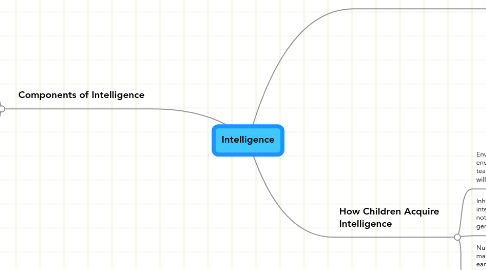Intelligence
by Kelsey Hyatt

1. Components of Intelligence
1.1. Role of Prior Experience- The way in which one's prior experiences are brought to bear on a particular task.
1.2. Role of Environment- Environmental context in which the behavior occurs and how one adapts.
1.3. Cognitive Process- The cognitive process required by the task.
1.4. Distributed Intelligence- The concept that one behaves intelligently when they have the support of their physical, social, and cultural environments.
1.5. Crystallized Intelligence- Knowledge and skills accumulated from prior experience and schooling (familiar tasks) and is constantly occurring throughout life. This component is inherited and learned.
1.6. Fluid Intelligence- Ability to acquire knowledge quickly and thereby adapt readily to new situations. This occurs throughout childhood and adolescents and begins to fade in ones 20's. This component is inherited.
2. Definition of Intelligence
2.1. My definition of intelligence is ones ability to learn from situations and experiences, old and new, and retain the taught information so they can recall on it at different times.
3. How Children Acquire Intelligence
3.1. Environment- Children gain knowledge through their environments and how they are taught from parents, teachers, or care givers. This is the basis for what children will be able to learn as they grow up.
3.2. Inheritance- Children are born with some intelligence based on their heredity. This is not learned, but given to them through genetics.
3.3. Nutrition- It is proven that if children are malnourished before or after birth in early years it can limit neurological development and have long term influence on cognitive development.


